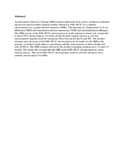| dc.contributor.author | Yin, S | |
| dc.contributor.author | Cai, M | |
| dc.contributor.author | Wang, C | |
| dc.contributor.author | Shen, PK | |
| dc.date.accessioned | 2013-06-27T12:14:57Z | |
| dc.date.available | 2013-06-27T12:14:57Z | |
| dc.date.issued | 2011 | |
| dc.identifier.citation | Electrochim. Acta, 2009, 54(12), 3412–3418 | en |
| dc.identifier.uri | http://pubs.rsc.org/en/content/articlelanding/2011/ee/c0ee00445f | |
| dc.identifier.uri | http://erepository.uonbi.ac.ke:8080/xmlui/handle/123456789/41142 | |
| dc.description.abstract | An intermittent microwave heating (IMH) assisted method has been used to synthesize palladium and iron on nanocrystalline tungsten carbide (denoted as PdFe-WC/C) as a cathodic electrocatalyst for oxygen reduction reactions (ORRs). The materials are characterized by X-ray diffraction (XRD) and transmission electron microscopy (TEM) and electrochemical techniques. The ORR activity of the PdFe-WC/C electrocatalyst in acidic solution is found to be comparable to that of Pt/C electrocatalysts. It is believed that the high catalytic activity as a Pt-free electrocatalyst originats from the synergistic effect between Pd and Fe and WC. The alcohol-tolerance and selectivity of the PdFe-WC/C electrocatalyst are favorable for the ORR in the presence of alcohol which makes it a promising cathodic electrocatalyst in direct alcohol fuel cells (DAFCs). The ORR is hardly affected in the alcohol-containing solutions up to 1.0 mol L−1 alcohol. The results also revealed that the ORR on the PdFe-WC/C electrocatalyst is a four-electron process. This novel PdFe-WC/C electrocatalyst could be a Pt-free alternative for a cathodic electrocatalyst for ORRs. | en |
| dc.language.iso | en | en |
| dc.publisher | University of Nairobi | en |
| dc.title | Tungsten carbide promoted Pd–Fe as alcohol-tolerant electrocatalysts for oxygen reduction reactions | en |
| dc.type | Article | en |
| local.publisher | Department of Physics | en |

